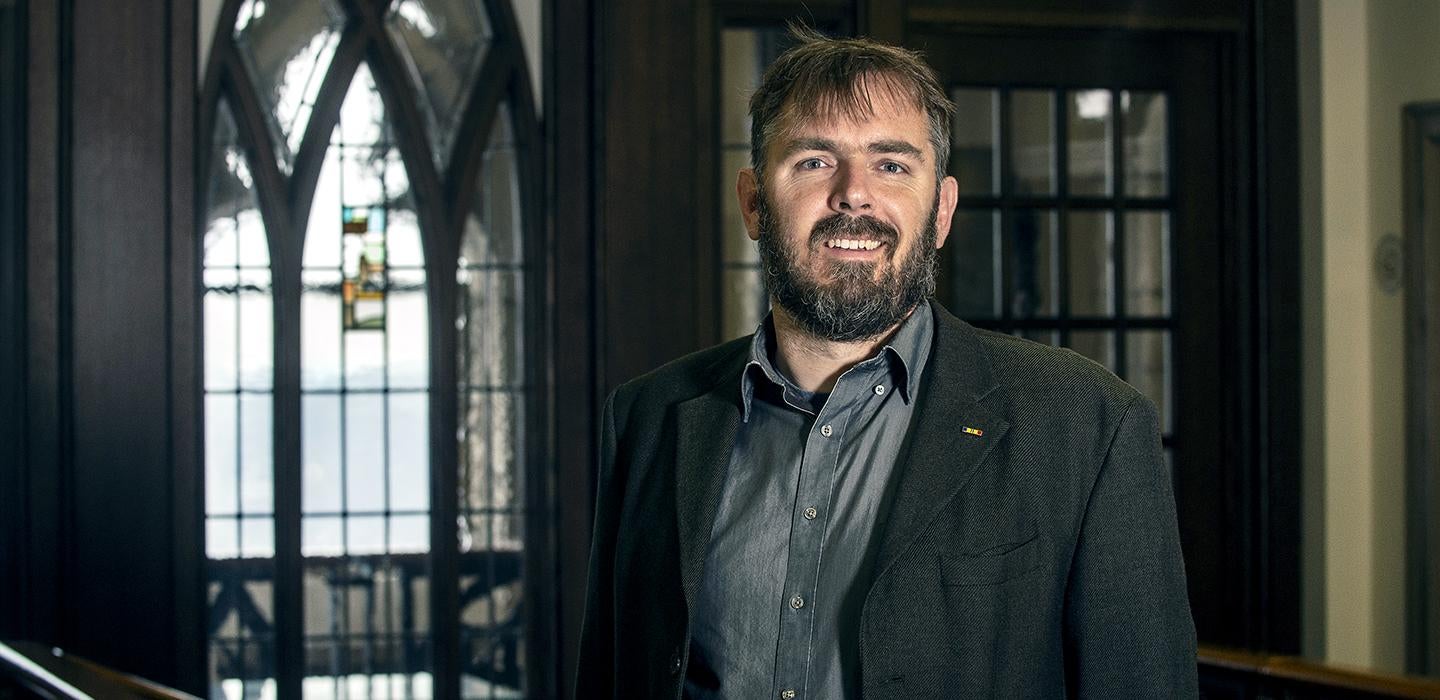
Subscribe to Pittwire Today
Get the most interesting and important stories from the University of Pittsburgh.When Josh Cannon walked into his ancient Mediterranean warfare class on March 22, one thing was instantly visible: a black eye.
“I got into a fight,” he told the class. (It wasn’t technically a lie. He went on to explain that he was punched in a jiujitsu class.)
That may make Cannon sound scary, but sitting in his class feels like a conversation with an excitable, extremely knowledgeable friend. One evening of lecture and discussion in the Classics Department class covered the founding mythology of Rome, linguistic origins of the names of emperors, battle tactics, poetry, paintings and a fight sequence from the film “The Last of the Mohicans.”
Oh, and what it’s like as a soldier on the battlefield, informed by his own experience as a veteran.
Cannon (A&S ’10), a scholar-mentor in the University Honors College, joined the Marine Corps weeks after graduating high school in Pittsburgh, heading to boot camp and combat training followed by a year and a half of intensive Arabic classes. He then served two tours of duty in Iraq in 2003 and 2004 as a cryptologic linguist, cracking codes and translating radio communications into English.
“I worked in tents, I worked in Humvees, I worked in light armored vehicles,” he said. “I was in combat multiple times, but I never had to fire my weapon. It never got so bad that the intel dudes had to do something about it.”
Learning the language and talking to locals sparked an interest in the Middle East and sent Cannon into academia. He first headed to Pitt, where he became interested in combining linguistics and archaeology under the training of Kenneth P. Dietrich School of Arts and Sciences Associate Professor Bryan Hanks, and then went to the University of Chicago for his PhD on the cultures and materials of people who lived in what is now Turkey in the 2nd millennium BCE.
Today, Cannon uses both his archaeology training and battlefield experience to teach.
On one hand, his lived experiences made him intimately familiar with war’s costs. When discussing the tens of thousands of soldiers who died in the Battle of Carrhae between Rome and the Parthian Empire, he tried to impress upon students the sheer magnitude of that loss.
“When we talk about battlefield casualties, it can feel abstract because it happened thousands of years ago,” Cannon said. “It’s so easy to say, ‘This is Game of Thrones in ancient Athens,’ but it isn’t that. Each of these people had a family that probably missed them after that battle.”
Cannon’s experience also allows him to draw parallels between how war was conducted 2,000 years ago and today, such as pointing out the similarities between the United States’ modern military system and the structure that ancient Rome pioneered. But his way of talking about war isn’t just about its gravity and reality — it’s also, paradoxically, about humor.
Even when sharing stories at events with other veterans, he found that his approach to talking about his service stood out. “Something that I noticed was that my stories were always uplifting or funny, and certainly very light,” Cannon said. “I’ve got some hard stories to tell, but I don’t think I’d find that cathartic.”
Cannon attributes that approach both to his personality and the nature of his service. It’s why you can hear him going on a tangent about a Daniel Day-Lewis performance in a class about ancient warfare (or why he gave an extra credit assignment to students where they can write fan fiction about one of the class topics). That attitude serves to draw his students into the class, too, like junior classics and art and architecture major Charlie Taylor.
“It opens up a lot more avenues for exploration than a class where we read about Julius Caesar and don’t talk about anything else,” said Taylor, who Cannon also advises through the University Honors College. Just as important, that attitude makes sitting in a two-and-a-half-hour evening class bearable. “I’d be reluctant to take it with anyone else,” they said.
Through his openness and willingness to engage, Cannon creates space for students to express themselves and explore their own interests. Taylor, for instance, is bringing their own study of gender and sexuality into the class by writing a paper about warrior masculinity in the “Iliad.”
For Cannon, it’s all in the interest of getting his students invested in the topic. And making sure he doesn’t take himself too seriously.
“Nobody’s doing this to get rich. We’re doing it because it’s interesting,” he said. “So let’s get to be friendly with each other and let this be a time that maybe you can look forward to.”
— Patrick Monahan, photo by Mike Drazdzinski


